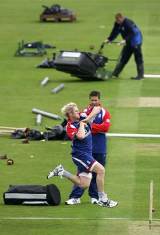Recapturing Troy
John Stern on how the Australians learnt to be a bit more English in their approach
John Stern
15-Dec-2005
|
|

|
So the Australians have taken Troy. I always thought it was the Greeks. But then they've never had much need for fast-bowling coaches.
Australia, on the other hand, clearly feel they do which is why they have persuaded one of their greatest exports since Kylie Minogue to return home.
For English cricket, Cooley's departure, which follows Rod Marsh's from their academy, represents the end of phase one of their quest for world domination. When the ECB were setting up their academy around the turn of the millennium they scoured the world for best practice in coaching, sports academies, nutrition, psychology. Much of that best practice was to be found in Australia. So they bought it.
Now the test is whether they can continue to succeed and develop players without the help of Australian expertise. Peter Moores, an Englishman with a greater reputation as a coach than as a player, is now running the academy. Time will tell how he performs.
Finding the English Troy Cooley is a tougher proposition and history suggests that Duncan Fletcher, the head coach, will be fussy - if time allows him to be. Cooley is the third bowling coach Fletcher has had in his five-year tenure with England. Bob Cottam and Graham Dilley, both former Test players, were dispensed with for reasons that were not entirely clear at the time but in essence they were both too 'old school' for Fletcher's tastes.
For the Australians to poach an England coach (even if he is actually an Aussie) is a feather in England's cap and an indication of the esteem in which England's fast-bowling attack is held.
Australia's hiring of Cooley is also an admission of a complacency that was apparent before and during the Ashes. It caused much consternation back home that Australia had no bowling or fielding coach while England had Australians doing both those jobs. Having been pioneers in the appliance of science to cricket, it was inconceivable that Australia could let things drift the way they did.
For Australia's sake, I hope they allow Cooley a free hand as he had in England. English cricket had until this summer a 'we are not worthy' attitude to Australian coaches with the result that someone like Cooley, with a meagre first-class record but a great reputation, was shown immediate respect and given time to develop relationships with players.
My suspicion is that Australia view his appointment as quick fix and a route to regaining the Ashes. But injury permitting, Australia's bowling attack for the 2006-07 Ashes will be McGrath, Lee, Warne and one other. The identity and form of that one other is probably the first thing on Cooley's to-do list. But how much work is he likely to do with a legend like Glenn McGrath?
Cooley helped England develop a fast-bowling unit through work with the academy and then moving up to the international side. It took him the best part of four years. His strengths are his knowledge of biomechanics and an ability to communicate complex ideas to players who are often among the least cerebral members of the team. "Troy speaks common sense," says Steve Harmison. "He speaks to you properly and doesn't try to baffle you with science or cricketing terms."
Cooley did great things for English cricket and hopefully he left a legacy. But he was part of a process, he's not a magician. He might have a heroic name but that doesn't make him superhuman.
John Stern is editor of The Wisden Cricketer